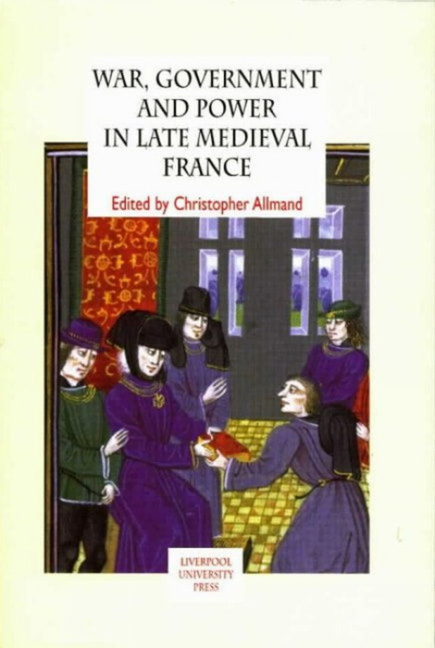Book contents
- Frontmatter
- Contents
- Dedication
- Acknowledgements
- Abbreviations
- Introduction
- 1 From the Court of Hainault to the Court of England: The Example of Jean Froissart
- 2 Froissart and his Second Book
- 3 Alain Chartier and the Arts of Crisis Management, 1417–1429
- 4 Intellectual Patterns and Affective Reactions in Defence of the Dauphin Charles, 1419–1422
- 5 War, Propaganda and Diplomacy in Fifteenth-Century France and England
- 6 History and the Literature of War: The Boke of Noblesse of William Worcester
- 7 Commynes on Kingship
- 8 ‘Centre’, ‘Power’ and ‘Periphery’ in Late Medieval French Historiography: Some Reflections
- 9 Centre and Periphery in Late Medieval France: Tournai, 1384–1477
- 10 ‘Decayed Feudalism’ and ‘Royal Clienteles’: Royal Office and Magnate Service in the Fifteenth Century
- 11 Justification and Theory of the Death Penalty at the Parlement of Paris in the Late Middle Ages
- 12 Membra disjecta of the Breton Chambre des Comptes in the Late Middle Ages: Treasures Revisited and Rediscovered
- Glossary
- Index
7 - Commynes on Kingship
- Frontmatter
- Contents
- Dedication
- Acknowledgements
- Abbreviations
- Introduction
- 1 From the Court of Hainault to the Court of England: The Example of Jean Froissart
- 2 Froissart and his Second Book
- 3 Alain Chartier and the Arts of Crisis Management, 1417–1429
- 4 Intellectual Patterns and Affective Reactions in Defence of the Dauphin Charles, 1419–1422
- 5 War, Propaganda and Diplomacy in Fifteenth-Century France and England
- 6 History and the Literature of War: The Boke of Noblesse of William Worcester
- 7 Commynes on Kingship
- 8 ‘Centre’, ‘Power’ and ‘Periphery’ in Late Medieval French Historiography: Some Reflections
- 9 Centre and Periphery in Late Medieval France: Tournai, 1384–1477
- 10 ‘Decayed Feudalism’ and ‘Royal Clienteles’: Royal Office and Magnate Service in the Fifteenth Century
- 11 Justification and Theory of the Death Penalty at the Parlement of Paris in the Late Middle Ages
- 12 Membra disjecta of the Breton Chambre des Comptes in the Late Middle Ages: Treasures Revisited and Rediscovered
- Glossary
- Index
Summary
In a well-known passage of his Storia d'Italia, Guicciardini recalls the remarkable courage of the French at the Battle of Fornovo. He ascribes their determination and spirit to the presence of the king, for whom they had a particular religious devotion: ‘the courage of the French was strengthened by the presence, by their side, of the King of France, endangering his own person (for, according to the ancestral custom of this nation, the majesty of kings is no less revered than the name of God is adored)’. The sacred character of kings in France and in those principalities (such as fifteenth-century Burgundy) where the princes had imperial or royal ambitions is well attested. Though it was impossible to accept that a man, even a king or a duke, could identify himself directly with God, the religious element in the representation of the king is increasingly marked in the mentality of the time. A royalist ideology satisfies this need for transcendence, and scholars in their writings echo this maximalist logic.
In this context, it is surprising to see a fifteenth-century writer move against the tide. But Commynes was no ordinary writer; indeed, he acknowledged as much himself. For example, the statement in his Mémoires ‘I do not follow the rules of historians’ should be understood to mean that he set little store by the literary stereotypes used by historians of his day to celebrate the monarchy. ‘Those chroniclers usually mention only that which is in praise of those persons they write about’: Commynes was thus certainly debunking the undertaking of the monks of Saint-Denis, and specifically the Grandes Chroniques de France. The Chroniques, of which Commynes must have been aware, were elaborated in successive layers from the thirteenth century onwards, and had the enormous benefit of presenting a sort of vulgate of royal history. As a written memory of kingship, they set out a coherent vision of the national past which became the ‘authentic and authorised version’ of French history with a division into three periods, those of the three dynasties or races or generations, consecrated with the instruments of the royal cult (the fleur de lis, oriflamme, and king's evil, for instance).
- Type
- Chapter
- Information
- War, Government and Power in Late Medieval France , pp. 106 - 123Publisher: Liverpool University PressPrint publication year: 2000



